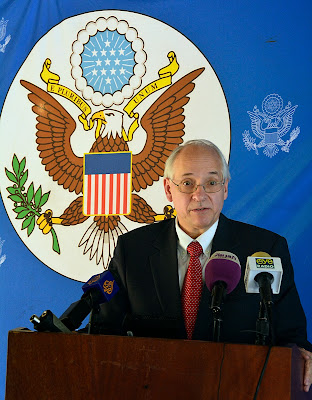Juba: Peace envoy sent but fights on: Rebel Chief Riek Machar
The United States special envoy to South Sudan, Donald Booth, speaks to the media on December 31, 2013 in Juba. South Sudan rebel leader Riek Machar agreed to send envoys to peace negotiations in Ethiopia Tuesday, but rejected face-to-face talks with President Salva Kiir, warning that his forces will continue to fight. The United States, which was a key backer of South Sudan's independence struggle, said the sending of negotiators was an important first step, special envoy Donald Booth said.
Machar, a former vice president accused of sparking deadly conflict by attempting a coup over two weeks ago, said his troops were still marching on the capital after claiming to have recaptured a key town.
“Our forces are still marching on Juba, there is no cessation of hostilities yet,” Machar told AFP via satellite telephone from an undisclosed location inside South Sudan.
Ignoring a deadline from regional powers for an immediate ceasefire, he said any halt in the more than two weeks of fighting “needed to be negotiated”.
“That is what the delegation is going to Addis Ababa to discuss and to negotiate,” he said, adding the chance of him meeting with Kiir in person “depends on how the negotiations go”.
The United States, which was a key backer of South Sudan's independence struggle, said the sending of negotiators was an “important first step”, special envoy Donald Booth said.
Officials in the Ethiopian capital confirmed that delegations from both sides were due to land in Addis Ababa, the headquarters of the African Union, later Tuesday with talks expected to start on Wednesday.
“I will follow later, once the negotiations have resulted in a cessation of hostilities. It depends on if and when that is achieved,” Machar said.
“We did not ask for this battle, it was forced upon us,” Machar added, reiterating his position that it was the president who started the fighting on December 15.
South Sudan is the world's youngest nation, having only won independence from Khartoum in 2011, but has been beset by poverty, corruption and ethnic tensions, including between the president's Dinka tribe, the largest in the country, and Machar's Nuer community.
Thousands of people are feared to have been killed in over two weeks of fighting, pitching army units loyal to Kiir against a loose alliance of ethnic militia forces and mutinous army commanders nominally headed by Machar.
The AU expressed “Africa's dismay and disappointment that the continent's newest nation should descend so quickly into civil strife”, warning of its potential to deteriorate into “full-fledged civil war”, even though many observers say this has already happened.
Heavy fighting continued to rage on Tuesday, with the rebels claiming they had recaptured Bor, capital of the powder-keg Jonglei state and situated just 200 kilometres (125 miles) north of the capital Juba, the third time the town has changed hands in two weeks.
“Bor is under our control... we are now in Bor town,” rebel spokesman Moses Ruai told AFP.
South Sudanese army spokesman Philip Aguer disputed the claim, saying the fighting was ongoing inside the town. A UN spokesman had also confirmed the town was under attack earlier Tuesday.

+north+of+the+capital+Colombo+on+November+18,+2013.jpg)


Post a Comment